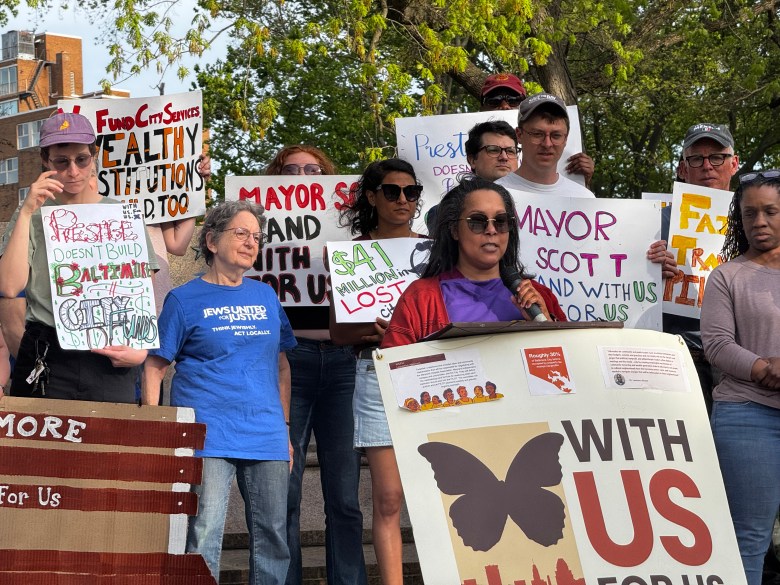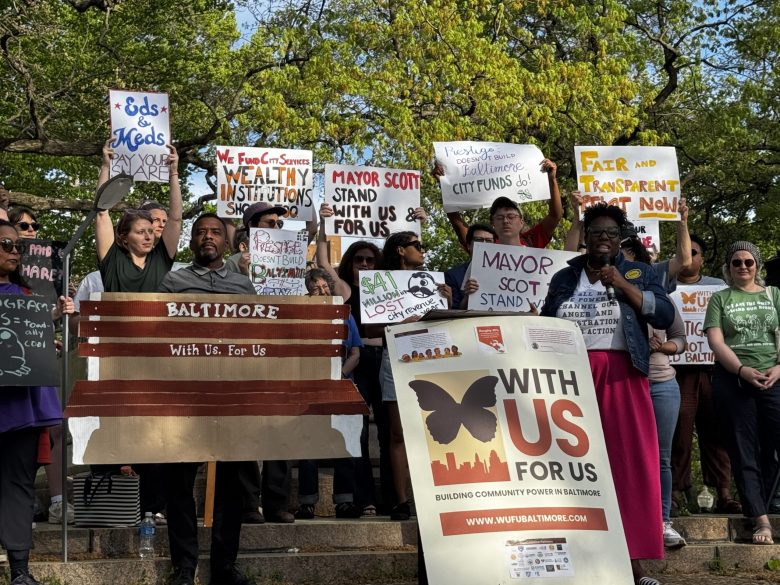In the shadow of Johns Hopkins University, about three dozen people gathered at Wyman Park Dell on April 22, to renew a demand that’s gaining traction across the country: make the city’s wealthiest tax-exempt institutions contribute their fair share to the communities they inhabit.
“We are here for a thriving Baltimore City,” said Christina Duncan Evans, Teacher Chapter Chair of the Baltimore Teachers Union, who kicked off the rally. “Too many Baltimore residents are disproportionately carrying the burden of institutions with endowments, with boards of directors, with development arms.”
Organized by the With Us For Us Coalition (WUFU) — a mix of union members, organizers, policy advocates, and residents — the rally launched a campaign to renegotiate Baltimore’s current Payment in Lieu of Taxes (PILOT) agreement. The current deal, which expires in 2026, allows 14 of the city’s largest hospitals and universities to pay a small fraction of what they’d owe if fully taxed, and far less than what many other cities are receiving from their PILOT agreements, according to a report from the office of City Comptroller Bill Henry.
The city’s tax-exempt anchor institutions argue that they do give back through charity and as job creators. But advocates question whether those benefits offset the city services these institutions consume.
According to the report, which is titled “Promising PILOTs: A Look at How Baltimore and Other Cities Manage Tax Gaps with Non-Profit Institutions,” if the properties owned by the 14 institutions were fully taxed, they would bring in $108 million annually. The current PILOT agreement allows them to pay just $6 million a year, while they use $47 million worth of city services annually, the report found.
This $41 million shortfall is the equivalent of “72 miles of road repair, 480 teachers and librarians, or preventing 15,000 evictions every year,” Chris Meyer, a research analyst at the Maryland Center on Economic Policy, pointed out at the rally.
Speakers highlighted the impact on the city’s budget. Baltimore’s property tax rate is the highest in Maryland — more than double of the state average — in part because so much valuable land is exempt from taxation, speakers argued. The comptroller’s report found that in total, property owned by city nonprofits is worth $389 million annually— leaving residents to pick up the slack.
In a city where one in four residents face food insecurity, speakers argued, the unfavorable PILOT deal exacerbates long standing racial and economic divides that shape daily life and result in underfunded essential services for Black and working-class communities.
“If these institutions want to be part of our community, they should make fair PILOT contributions so the benefits go to everyone,” said healthcare worker Antonia Brooks. Brooks said the extra revenue would, “make people’s lives better, especially for our young people, by investing in parks and recreation centers.”
At the heart of this campaign is Council Bill 25-0036, introduced by Councilmember Phylicia Porter, and backed by 11 co-sponsors. The measure would create a 17-member task force that would renegotiate the PILOT agreement.
At the heart of this campaign is Council Bill 25-0036, introduced by Councilmember Phylicia Porter, and backed by 11 co-sponsors. The measure would create a 17-member task force that would renegotiate the PILOT agreement. Baltimore’s previous PILOT negotiations were conducted behind closed doors without public input. This time around, union reps and residents earning below the city’s median income would have a seat at the table.

The push for a new PILOT agreement comes as states and cities face growing budget uncertainty. The Trump administration has already slashed hundreds of millions of dollars of health grants to Maryland. Baltimore receives $350 million in federal funds which are potentially at risk.
The city’s large institutions have also been impacted, with Johns Hopkins, the city’s largest private employer, losing $800 million dollars in federal grants.
But as Hopkins Graduate Student Melissa Kissling noted, the University has a $13 billion endowment to fall back on; the city’s residents don’t have that luxury.
“A giant number that sits in bank accounts and stock portfolios does nothing for the benefit of real people” Kissling said, calling it “disrespect for the community of Baltimore.”
Organizers are looking at cities like Boston, New Haven, and Providence, which have negotiated far better deals that are also more transparent.
Organizers are looking at cities like Boston, New Haven, and Providence, which have negotiated far better deals that are also more transparent. Boston, for instance, collects $35 million annually under its voluntary PILOT program, which requests nonprofits to contribute 25% of what they’d owe in property taxes.
Providence, R.I., recently negotiated a PILOT agreement that more than doubled its previous deal, securing $223 million over 20 years from its four major universities. Organizers believe Baltimore can follow that example — and push even further.
“The floor for PILOT payments should at least cover the $47 million in services these institutions consume,” said Lester Spence, professor at Johns Hopkins University. “That would give the city breathing room to fund schools, to sustain public health, to stop relying on grant money just to keep essential departments running.”
Nneka Nnamdi of Fight Blight Bmore, an organization working to reduce the number of dilapidated buildings in the city and help communities build equity, highlighted another cost: “When anchor institutions hold vacant properties, it worsens the housing crisis. Their development plans drive speculation, pushing up costs in surrounding neighborhoods.”
Nnamdi pointed to a deeper injustice. “The services these institutions receive are subsidized by the very residents they underserve. Around 30% of properties in Baltimore — many of the most valuable — are exempt from taxation because they’re owned by nonprofits.”
As the task force proposal advances, organizers are making it clear this isn’t just about balancing the books—it’s about making the powerful institutions accountable to city residents. They’re calling for a transparent formula, annual inflation adjustments, and public reporting on institutional contributions.
For now, the clock is ticking. With the current agreement expiring in 2026, the With Us For Us Coalition is building pressure. They know that without community power, Baltimore risks signing another deal that leaves working people holding the bag.
“The directly impacted need and deserve to be at the table,” said Duncan Evans, “And this is an opportunity to transform the relationship between institutions and Baltimore community members.”

